Although it might not be a part of the Common Core State Standards or easy to measure, teaching our students compassion, empathy, and understanding is an important part of the curriculum. Following are some recently published books that are good choices for reading aloud to foster discussion as well as for independent reading.
Ages 4–8
Big Mouth Elizabeth (A Is for Elizabeth #2). Rachel Vail. Ill. Paige Keiser. 2019. Feiwel and Friends/Macmillan.
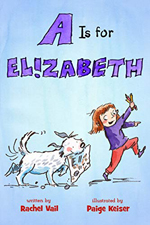 Second grader Elizabeth Case longs to be part of the Big Mouth Club, which is made up of children who have lost a baby tooth. Because she hasn’t done so yet, Elizabeth feels immature. When a classmate she calls Babyish Cali reaches out to her, Elizabeth is reluctant to accept her offer of friendship. With insistence from her mother, she accepts a playdate and realizes that Cali isn’t all that babyish, after all. The text and illustrations in this chapter book capture perfectly how it feels to be left out as well as how affirming it feels to be a part of something. In all her relatable imperfections, Elizabeth will remind many readers of themselves. Reading the book aloud might provide an avenue for discussing acceptance, inclusion, and empathy.
Second grader Elizabeth Case longs to be part of the Big Mouth Club, which is made up of children who have lost a baby tooth. Because she hasn’t done so yet, Elizabeth feels immature. When a classmate she calls Babyish Cali reaches out to her, Elizabeth is reluctant to accept her offer of friendship. With insistence from her mother, she accepts a playdate and realizes that Cali isn’t all that babyish, after all. The text and illustrations in this chapter book capture perfectly how it feels to be left out as well as how affirming it feels to be a part of something. In all her relatable imperfections, Elizabeth will remind many readers of themselves. Reading the book aloud might provide an avenue for discussing acceptance, inclusion, and empathy.
Lili Macaroni. Nicole Testa. Ill. Annie Boulanger. 2019. Pajama Press.
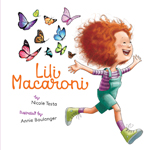 Lili Macaroni loves all the things that make her unique since they come from her mother, father, grandmother, and grandfather. But her self-esteem is rocked once she begins school and classmates tease her about her name, her hair, her freckles, her eyes, and even her laugh. Consequently, Lili starts to withdraw and wonders what life might be like if she didn't have these features. Although she draws a self-portrait that erases them, ultimately, she decides that rejecting these parts of her would be like rejecting her family, something she doesn't want to do. She follows her father's suggestion to draw a butterfly, which will then help her feel better as it flies away with her heartache. Lili is fortunate to have an understanding teacher in Mrs. Tamara, who hugs her when she shares her feelings and her polka dotted butterfly. Her classmates feel guilty about what they've done, and they come back to class after the weekend with their own butterflies.
Lili Macaroni loves all the things that make her unique since they come from her mother, father, grandmother, and grandfather. But her self-esteem is rocked once she begins school and classmates tease her about her name, her hair, her freckles, her eyes, and even her laugh. Consequently, Lili starts to withdraw and wonders what life might be like if she didn't have these features. Although she draws a self-portrait that erases them, ultimately, she decides that rejecting these parts of her would be like rejecting her family, something she doesn't want to do. She follows her father's suggestion to draw a butterfly, which will then help her feel better as it flies away with her heartache. Lili is fortunate to have an understanding teacher in Mrs. Tamara, who hugs her when she shares her feelings and her polka dotted butterfly. Her classmates feel guilty about what they've done, and they come back to class after the weekend with their own butterflies.
A Place to Stay: A Shelter Story. Erin Gunti. Ill. Esteli Meza. 2019. Barefoot.
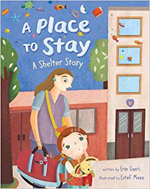 This picture book follows a mother and her daughter on the first night of their stay in a shelter, during which Mama tries to cast the building as a palace with a treasure cave and a rocket ship. After meeting a couple of residents and making a friend, the young girl is ready for a shower and decides to match her mother's imaginative play by pretending that the two of them are deep sea divers while the water warms up. The shelter isn't home but, at least it is a safe, warm place. Created with pencils and acrylic paints and then digitally manipulated, the illustrations capture the child's nervousness and her mother's imaginative response to their surroundings, which are surely bleak in some respects. Back matter includes a discussion of reasons that someone might be staying in a shelter like this, making A Place to Stay a good introduction to homelessness for young children.
This picture book follows a mother and her daughter on the first night of their stay in a shelter, during which Mama tries to cast the building as a palace with a treasure cave and a rocket ship. After meeting a couple of residents and making a friend, the young girl is ready for a shower and decides to match her mother's imaginative play by pretending that the two of them are deep sea divers while the water warms up. The shelter isn't home but, at least it is a safe, warm place. Created with pencils and acrylic paints and then digitally manipulated, the illustrations capture the child's nervousness and her mother's imaginative response to their surroundings, which are surely bleak in some respects. Back matter includes a discussion of reasons that someone might be staying in a shelter like this, making A Place to Stay a good introduction to homelessness for young children.
Say Something. Peter H. Reynolds. 2019. Orchard/Scholastic.
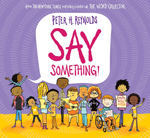 The endpapers of this picture book contain encouraging words and mark instances in which someone has spoken up or coined a pithy saying. The book itself is a simple but important reminder that all voices matter and that the speaker need not worry about getting all the words right or being loud. All that matters is speaking up through spoken or written words or actions. The book also provides specific examples of possible actions upon encountering various situations such as a blank canvas, a lonely person, fallow ground, and someone being bullied. The text and images remind readers that a voice "can inspire, heal, and transform. Your voice can change the world,” inviting readers to get involved and "say something.” This small picture book offers much food for discussion about the power of words and deeds and what we lose by not saying something.
The endpapers of this picture book contain encouraging words and mark instances in which someone has spoken up or coined a pithy saying. The book itself is a simple but important reminder that all voices matter and that the speaker need not worry about getting all the words right or being loud. All that matters is speaking up through spoken or written words or actions. The book also provides specific examples of possible actions upon encountering various situations such as a blank canvas, a lonely person, fallow ground, and someone being bullied. The text and images remind readers that a voice "can inspire, heal, and transform. Your voice can change the world,” inviting readers to get involved and "say something.” This small picture book offers much food for discussion about the power of words and deeds and what we lose by not saying something.
Ages 9–11
Because of the Rabbit. Cynthia Lord. 2019. Scholastic.
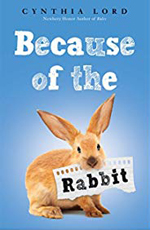 With the lightest of touches, Cynthia Lord tells a story about staying true to yourself. Emma has been homeschooled but after her older brother, Owen, decides to attend public high school, she wants to give public school a try, too. It isn't an easy transition. The fifth graders have established social sets, and anything different from what they see as the norm is considered unacceptable. Emma tells little lies or partial truths to be accepted by a group of girls, and she even betrays Jack, the only classmate who was kind and welcoming from the start. Like her, he loves animals and has some unusual hobbies, but classmates shun him and consider him to be different—in a bad way. When Jack visits her home to work on a school project, she introduces him to Lapi, a bunny that she and her father rescued. When another classmate mentions that she saw posters looking for a lost bunny during the summer, Emma knows she must do the right thing and see if she has that person's pet. She also comes to realize that the best friend she's been looking for has been there all along.
With the lightest of touches, Cynthia Lord tells a story about staying true to yourself. Emma has been homeschooled but after her older brother, Owen, decides to attend public high school, she wants to give public school a try, too. It isn't an easy transition. The fifth graders have established social sets, and anything different from what they see as the norm is considered unacceptable. Emma tells little lies or partial truths to be accepted by a group of girls, and she even betrays Jack, the only classmate who was kind and welcoming from the start. Like her, he loves animals and has some unusual hobbies, but classmates shun him and consider him to be different—in a bad way. When Jack visits her home to work on a school project, she introduces him to Lapi, a bunny that she and her father rescued. When another classmate mentions that she saw posters looking for a lost bunny during the summer, Emma knows she must do the right thing and see if she has that person's pet. She also comes to realize that the best friend she's been looking for has been there all along.
Harvey Comes Home. Colleen Nelson. Ill. Tara Anderson. 2019. Pajama Press.
 When his human companion, Maggie, is away on a trip with her family, Harvey (a terrier) follows the scent of a squirrel out of his yard and gets lost. Eventually, he ends up outside Brayside, an assisted living facility where a boy named Austin is volunteering. Austin knows that Harvey must belong to someone, but he becomes attached to the dog. Harvey becomes the bridge between Austin and Mr. Walter Pickering, a miserable elderly man shunned by just about everyone because of his grumpiness. As the three spend time together, Mr. Pickering tells stories from his youth about his beloved dog, General; rough times on the prairies during the Great Depression and its aftermath; and a girl named Bertie. The chapters alternate from the perspectives of Austin, Harvey, and Maggie, an effective device that allows readers to develop an understanding of the emotions and behaviors of the characters.
When his human companion, Maggie, is away on a trip with her family, Harvey (a terrier) follows the scent of a squirrel out of his yard and gets lost. Eventually, he ends up outside Brayside, an assisted living facility where a boy named Austin is volunteering. Austin knows that Harvey must belong to someone, but he becomes attached to the dog. Harvey becomes the bridge between Austin and Mr. Walter Pickering, a miserable elderly man shunned by just about everyone because of his grumpiness. As the three spend time together, Mr. Pickering tells stories from his youth about his beloved dog, General; rough times on the prairies during the Great Depression and its aftermath; and a girl named Bertie. The chapters alternate from the perspectives of Austin, Harvey, and Maggie, an effective device that allows readers to develop an understanding of the emotions and behaviors of the characters.
Pie in the Sky. Remy Lai. 2019. Henry Holt/Macmillan.
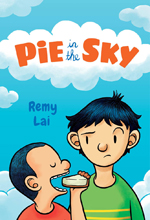 After the death of his father, 11-year-old Jingwen, his younger brother Yanghao, and their mother move to Australia from China, something his father had dreamed of doing. Lost in a new culture and awash in a new language, Jingwen carries a lot of emotional baggage, but he becomes convinced that life will improve if he bakes the special cakes he and his father once baked together while dreaming of their future bakery in their new home. As the two brothers prepare each of their father’s cakes, they end up eating them all to hide their activities from their mother who has forbidden them to use the oven while she is at work. While the classroom scenes depicting Jingwen’s struggles to read aloud are painful to read, readers will enjoy the humor of Remy Lai’s text and cartoon illustration, and the descriptions of these special cakes may prompt them to do some baking. (A recipe for Rainbow Cake is included.)
After the death of his father, 11-year-old Jingwen, his younger brother Yanghao, and their mother move to Australia from China, something his father had dreamed of doing. Lost in a new culture and awash in a new language, Jingwen carries a lot of emotional baggage, but he becomes convinced that life will improve if he bakes the special cakes he and his father once baked together while dreaming of their future bakery in their new home. As the two brothers prepare each of their father’s cakes, they end up eating them all to hide their activities from their mother who has forbidden them to use the oven while she is at work. While the classroom scenes depicting Jingwen’s struggles to read aloud are painful to read, readers will enjoy the humor of Remy Lai’s text and cartoon illustration, and the descriptions of these special cakes may prompt them to do some baking. (A recipe for Rainbow Cake is included.)
Ages 12–14
Focused. Alyson Gerber. 2019. Scholastic.
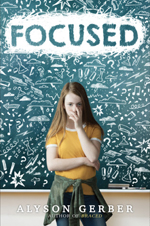 Seventh-grader Clea Adams has every intention to complete her homework and stay focused on tasks, but lately, it has been a challenge to do so. When her poor academic performance jeopardizes her involvement on the school chess team, Clea also struggles with her friendships, her parents, her teachers, and herself, even denigrating her own intelligence. After she has been tested and identified as having ADHD, Clea finally has some answers for why her attention is scattered. With the help of medication and counseling as well as support from her friend, Sanam, she learns some coping mechanisms. Still, hers is not an overnight success story since she still sometimes blurts things out without thinking and is easily distracted by certain noises. Readers’ hearts will hurt for this well-intentioned girl as she tries to navigate unexpected challenges.
Seventh-grader Clea Adams has every intention to complete her homework and stay focused on tasks, but lately, it has been a challenge to do so. When her poor academic performance jeopardizes her involvement on the school chess team, Clea also struggles with her friendships, her parents, her teachers, and herself, even denigrating her own intelligence. After she has been tested and identified as having ADHD, Clea finally has some answers for why her attention is scattered. With the help of medication and counseling as well as support from her friend, Sanam, she learns some coping mechanisms. Still, hers is not an overnight success story since she still sometimes blurts things out without thinking and is easily distracted by certain noises. Readers’ hearts will hurt for this well-intentioned girl as she tries to navigate unexpected challenges.
Ages 15+
Laura Dean Keeps Breaking Up With Me. Mariko Tamaki. Ill. Rosemary Valero-O’Connell. 2019. First Second/Roaring Brook.
 Love might be a many splendored thing, as a song tells us, but it can also be painful. In the case of Laura Dean, as charismatic, charming, and romantic as she might be, she is not right for Frederica Riley. Despite their turbulent relationship, Freddy takes Laura Dean back after each break up, moping around and running back to her when beckoned. When Laura Dean toys with her yet again, causing Freddy to abandon her friend Doodle in her hour of need, she has finally had enough and does what every reader will want her to do—break up with Laura Dean for good. The text and illustrations in this graphic novel capture the feeling of first love as well as the desolation of being addicted to someone poisonous and careless with the hearts of others.
Love might be a many splendored thing, as a song tells us, but it can also be painful. In the case of Laura Dean, as charismatic, charming, and romantic as she might be, she is not right for Frederica Riley. Despite their turbulent relationship, Freddy takes Laura Dean back after each break up, moping around and running back to her when beckoned. When Laura Dean toys with her yet again, causing Freddy to abandon her friend Doodle in her hour of need, she has finally had enough and does what every reader will want her to do—break up with Laura Dean for good. The text and illustrations in this graphic novel capture the feeling of first love as well as the desolation of being addicted to someone poisonous and careless with the hearts of others.
Barbara A. Ward teaches graduate and undergraduate courses in literacy at Washington State University, Pullman. She spent 25 years teaching in the public schools of New Orleans, where she worked with students at every grade level, from kindergarten through high school as well as several ability levels. She is certified in elementary education, English education, and gifted education. She holds a bachelor's in communications, a master's in English education from the University of Tennessee, and a PhD in Curriculum and Instruction from the University of New Orleans.
These reviews are submitted by members of the International Literacy Association's Children's Literature and Reading Special Interest Group (CL/R SIG) and are published weekly on Literacy Daily.